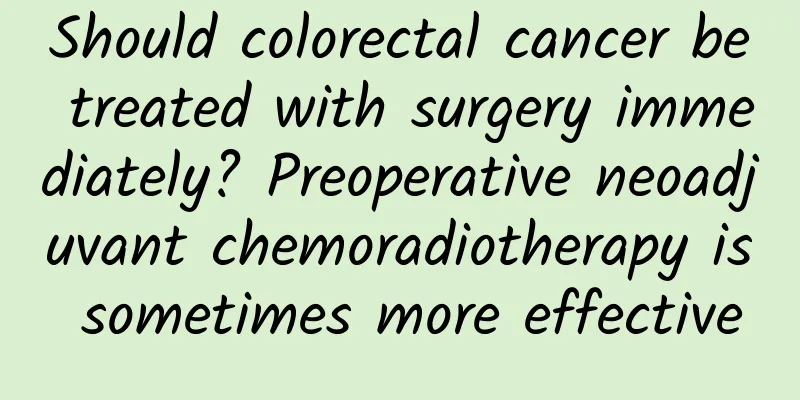Should colorectal cancer be treated with surgery immediately? Preoperative neoadjuvant chemoradiotherapy is sometimes more effective

|
"Doctor, I've had a biopsy. Can you do the surgery tomorrow?" "If I don't do the surgery now, what if the cancer cells metastasize?" Many patients have this kind of panic, thinking that they need to have surgery immediately after cancer is discovered. Is this really the case? The reporter consulted an expert in the Department of Oncology at Jiangsu Provincial Hospital of Traditional Chinese Medicine. Blood in the stool should alert you to cancer Aunt Fang, 60, just had her grandson this year and was enjoying the joy of family life. But things never go as planned. In March this year, she found that her stool contained blood, which was large in amount and dark red in color. She rushed to the Zidong Branch of Jiangsu Provincial Hospital of Traditional Chinese Medicine for treatment. The colonoscopy results suggested rectal cancer, and further pathological examination of the tissues obtained by colonoscopy confirmed rectal adenocarcinoma. Coincidentally, 69-year-old Mr. Ding also went to a local hospital for examination due to bleeding in his stool. Colonoscopy showed rectal adenocarcinoma grade 2. He then went to the hospital for a CT scan, which showed thickening of the rectal wall and enlargement of the surrounding mesenteric lymph nodes, which may be malignant lesions. Pathological examination confirmed rectal adenocarcinoma. Further MRI showed: lower rectal cancer, and metastatic lymph nodes were considered. Colorectal cancer is the third most common cancer and the second leading cause of cancer death in the world, with an estimated 1.9 million new cases of colorectal cancer and 935,000 deaths in 2020. The incidence of male patients is significantly higher than that of female patients; and the incidence of colorectal cancer increases with age, reaching a peak in people aged 60 to 75 years. In recent years, with economic development and changes in lifestyle and diet, the incidence and mortality of colorectal cancer in China have increased. In 2020, newly diagnosed cases of colorectal cancer in China accounted for 28.8% of all new cases worldwide, and colorectal cancer-related deaths accounted for 30.6% of all colorectal cancer-related deaths worldwide, which has placed a heavy burden on the medical system. Therefore, developing measures to curb the increasing burden of colorectal cancer is challenging and highly relevant to public health. Neoadjuvant therapy before surgery After Aunt Fang and Grandpa Ding were admitted to the Department of Oncology of the Zidong Campus of the Provincial Hospital of Traditional Chinese Medicine, under the leadership of Qian Jun, director of the hospital's Oncology Department, the department's chief physician Tian Yun and his team combined professional knowledge and clinical experience to assess the patients' conditions, and organized a multidisciplinary joint diagnosis and treatment (MDT) discussion with the anorectal department and the radiotherapy department. With reference to the NCCN and CSCO diagnosis and treatment guidelines, they reached a unanimous conclusion: patients benefit more clinically from neoadjuvant therapy. After communicating the diagnosis and treatment plan with the patient and her family, the family had concerns, thinking that rushing the surgery would be more helpful for the patient's condition. Tian Yun repeatedly communicated with the patient and her family, patiently explaining neoadjuvant therapy, "Neoadjuvant therapy helps shrink the tumor, prevents tumor spread, and improves the overall treatment effect." In the end, the two patients agreed to neoadjuvant therapy. Aunt Fang underwent radiotherapy combined with adjuvant chemotherapy with capecitabine tablets from March 30 to May 4, and then interspersed oxaliplatin injection + capecitabine intravenous chemotherapy before surgery. Postoperative pathology showed that neoadjuvant therapy achieved complete pathological remission, that is, no tumor cells were found in postoperative pathology. Aunt Fang recovered well after surgery and was very satisfied with the treatment effect. Uncle Ding also received rectal radiotherapy before surgery, supplemented by capecitabine adjuvant chemotherapy. During this period, the team gave full play to the characteristics of combining traditional Chinese and Western medicine, and assisted with oral Chinese medicine and ear acupoint pressing and other traditional Chinese medicine operations to strengthen the body and eliminate evil. The patient did not have any adverse reactions such as nausea and vomiting during the treatment. Dietary principles for preventing colorectal cancer Correct bad eating habits, eat foods rich in dietary fiber, take in sufficient trace elements, control the intake of fat and meat, and eat less pickled food. We should focus on forming good eating habits, a balanced diet, increasing the intake of vegetables, fruits, nuts and whole grains, and enhancing the body's resistance to prevent colorectal cancer. From the above two cases, it can be seen that preoperative neoadjuvant chemoradiotherapy combined with surgical treatment has produced a very ideal therapeutic effect. Oncology experts from the Provincial Hospital of Traditional Chinese Medicine give full play to the efficacy of MDT and neoadjuvant chemoradiotherapy in locally advanced rectal cancer (i.e. clinically diagnosed as T3, T4 stage and (or) with lymph node metastasis and no distant metastasis of colorectal cancer), improve the preservation of anal function and reduce the scope of surgery; neoadjuvant chemotherapy can also promote the downstaging of locally advanced colon cancer (T3, T4 stage or lymph node positive without distant metastasis), reduce tumor volume, reduce the risk of tumor cell shedding and metastasis during surgery, thereby increasing the R0 resection rate and reducing the risk of postoperative recurrence, and improving the overall survival rate. At the same time, it can also be observed that the patient's preoperative neoadjuvant treatment is well tolerated, the tumor is highly sensitive to chemotherapy drugs, and the adverse reactions of chemoradiotherapy are low, providing a certain reference for postoperative adjuvant treatment plans. Preoperative conversion therapy is mainly suitable for patients with advanced colon cancer who are initially unresectable or require combined multi-organ resection. Through chemotherapy, targeted, immunotherapy and other methods, the resectability of the tumor is improved. |
<<: Can keeping onions at home prevent the flu?
>>: What is recovery from mental disorders?
Recommend
What to do if a pregnant woman can't breathe
In life, many people pay more attention to the ph...
How to put the mask when not in use Where to put the mask when not in use
We all know that masks are a kind of protective e...
Tips for diabetes care: Keep your feet healthy with exercise
Author: Yang Li, The Fifth Medical Center, PLA Ge...
How long does it take for your appetite to increase during pregnancy?
Because women's bodies vary greatly from pers...
Women without menstruation have a shorter life span
The sign of every woman's maturity is having ...
Trend Micro: Android malware is expected to reach 130,000 in Q4 2012
Android malware surges, study finds In the early ...
What should women do when they have dysmenorrhea?
Women may experience dysmenorrhea during their me...
What is the cause of brown discharge from female genitals?
Many female friends will notice that there are al...
Ureaplasma urealyticum positive symptoms in women
A positive Ureaplasma urealyticum test result in ...
What should women eat to help them get pregnant?
Many women feel that the process of preparing for...
Is minimally invasive uterine fibroids painful?
Patients with uterine fibroids need to go to a re...
What is the reason for high white blood cell count after childbirth?
Pregnancy and childbirth are a major event in the...
When will the domestic nine-valent HPV vaccine be available? Which is better, the domestic HPV vaccine or the imported vaccine?
The domestic HPV vaccine is bivalent and costs 32...
What medicine should I take for bleeding after IUD insertion?
Although the two-child policy has been fully libe...
What causes swelling inside the vagina?
There are always some women who often feel swelli...









